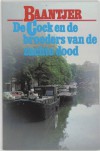The Private Memoirs and Confessions of a Justified Sinner
 First sentence: "It appears from tradition, as well as some parish registers still extant, that the lands of Dalcastle (or Dalchastel, as it is often spelled) were possessed by a family of the name of Colwan, about one hundred and fifty years ago, and for at least a century previous to that period."
First sentence: "It appears from tradition, as well as some parish registers still extant, that the lands of Dalcastle (or Dalchastel, as it is often spelled) were possessed by a family of the name of Colwan, about one hundred and fifty years ago, and for at least a century previous to that period."P. 99: "What was my astonishment on perceiving that he was the same being as myself!"
Last sentence: "And, in order to escape from an ideal tormentor, committed that act for which, according to the tenets he embraced, there was no remission, and which consigned his memory and his name to everlasting detestation."
From Wikipedia:
Many of the events of the novel are narrated twice. First by the 'editor', who gives his account of the facts as he understands them to be, and then in the words of the 'sinner' himself.
The 'Editor's Narrative' starts in 1687 with the marriage of Rabina Orde to the much older George Colwan, the Laird of Dalcastle. Rabina disapproves of her new husband because he lacks her religious beliefs, dances and drinks alcohol, leading to the couple soon separating. However, Rabina Colwan gives birth to two children. The first, George, is the son of the Laird. It is strongly implied, though never absolutely confirmed, that her second son, Robert, was fathered by the Reverend Wringhim, Rabina’s spiritual adviser.
George, raised by the Laird, becomes a friendly young man who enjoys sports and the company of his friends. Robert, educated by his mother and adoptive father Wringhim, is brought up to follow Wringhim’s radical sect of Calvinism, which holds that only certain elect people are predestined to be saved by God. These chosen few will have a heavenly reward regardless of how their lives are lived.
The two brothers meet, as young men, in Edinburgh where Robert starts following George through the town, mocking and provoking him and disrupting his life. He appears to have the ability of appearing wherever George is. When on a hill-top, George sees a vision of his brother in the sky and turns to find him behind him, preparing to throw him off a cliff. Robert rejects any friendly or placatory advances from his brother.
Finally, George is murdered, stabbed in the back, apparently during a duel with one of his drinking acquaintances. The only witness to the murder is a prostitute, who claims that the culprit was Robert, aided by what appears to be the double of George’s friend. Before Robert can be arrested, he disappears.
The second part of the novel, 'Private Memoirs and Confessions of a Justified Sinner', consists of Robert's account of his life. It is, supposedly, a document, some of it handwritten, and some printed, which was found after his death. It recounts his childhood, under the influence of the Rev Wringhim, and goes on to explain how he becomes in thrall to an enigmatic companion who says his name is Gil-Martin. This stranger, who could be seen to be the devil, appears after Wringhim has declared Robert to be a member of 'the elect' and so predestined to eternal salvation. Gil-Martin, who is able to transform his appearance at will, soon directs all of Robert’s pre-existing tendencies and beliefs to evil purposes, convincing him that it is his mission to “cut sinners off with the sword”, and that murder can be the correct course of action.
The confession traces Robert's gradual decline into despair and madness, as his doubts about the righteousness of his cause are counteracted by Gil-Martin’s increasing domination over his life. Finally, Robert loses control over his own identity and even loses track of time. During these lost weeks and months, it is possible that Gil-Martin assumes Robert’s appearance in order to commit further crimes. However, there are also suggestions in the text, that 'Gil-Martin' is a figment of Robert's imagination, and is simply an aspect of his own personality: as, for example when 'the sinner' writes: 'I feel as if I were the same person' (as Gil-Martin).
The novel concludes with a return to the 'Editor's Narrative' which explains how the sinner's memoir was discovered.
I thought this was a rather dull read, certainly not something to read again in a couple of years.
Other thoughts/reviews:
Shelf Love: http://shelflove.wordpress.com/2013/03/28/the-private-memoirs-and-confessions-of-a-justified-sinner/





